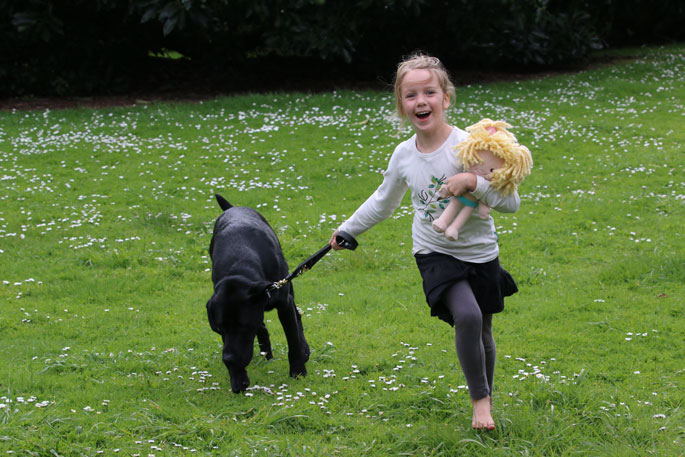Five-year-old Georgie Farrell often turns heads when she's out with Mum and Dad. Not because of her limitless energy or cheeky manner, but because she's usually harnessed to her mum.
Diagnosed with Autism Spectrum Disorder with Global Developmental Delay, including speech delay, at age three, Georgie has a lack of personal safety awareness and is often unaware of the dangers around her.
Accepted into the Assistance Dogs New Zealand programme, the Farrell's have raised $20,000 to cover training of an assistance dog to give Georgie a companion in stressful situations and something for her to focus on.
His name is Lobo and he's Georgie's new best friend. The almost-two-year-old black Labrador also signals Georgie's disability in public, as she'll be harnessed to him instead of Mum.
'We have toddler reins, which we use when we go out in a place that's unfamiliar to us and could be quite a risk for her,” says mum Liz.
'But it does get a bit old having people telling you you're treating your child like a dog, whereas if people see you with a dog, hopefully we will have more of a positive reaction rather than people thinking we're bad parents.”
Lobo arrived at the Farrell's Omokoroa home on September 2 and slipped naturally into the family's routine.
'It straight away felt absolutely normal,” says Liz. 'All the children were really happy.
'The first night we said: ‘Shall Lobo stay in Georgie's room?' She said, ‘No'. But the following day when she'd had the whole day with him she picked up his blanket and took it to her room and pointed to Lobo's bed.
'She gives him big cuddles and kisses him on his paw.”
Liz and husband Matthew have had some basic training with an Assistance Dogs NZ trainer, learning voice commands and hand signals with Lobo. They'll spend a week bonding with the dog before they receive further training.
'It means we'll be able to get out and about a bit more,” says Liz. 'Up until this we've only been able to go to places where they're fully fenced and there aren't many public parks that are.
'If you're driving somewhere with the family, you plan where you're going to stop for lunch on the basis of what's fenced or what's safe.
'I'm sure after six months we'll wonder how we ever managed without.”
To learn more about assistance dogs, or to donate, visit www.assistancedogstrust.org.nz
Training an assistance dog takes about six months. They receive assessment, basic obedience and social behaviour training, home behaviour training and specific task training.
ADNZ dogs are trained to be well behaved and capable of working in a variety of environments. They are taught to:
- Behave well in social situations
- Behave well in the home environment
- Recall promptly to the handler
- Basic obedience tasks to assist with ease of handling
- Walk calmly on lead without excessive tension or distraction
- Toilet on command
They are trained tasks based on each client's specific needs, relative to the type of impairment. ADNZ dogs can be trained in areas including:
- Retrieve objects that are dropped
- Deposit items in a correct place
- Tugging objects to move or open an item
- Holding position to secure client in a safe place
- Pressure contact to provide comfort in stressful or anxiety provoking situations
- Helping to locate a client who has wandered off

